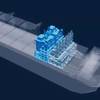UK to Use Satellites to Track Ship Emissions
An initiative aiming to help track and reduce shipping's carbon emissions is among five projects recently awarded U.K. government funding through the country's Space Agency.
The University of Leicester will use satellite analytics to track the greenhouse gas and pollution emissions of shipping fleets, ushering in a new approach that could help shipping companies to face down climate change.
The university will work with Redshift Associates Ltd to develop analytics to track the carbon and pollution emissions of ships, with a new approach to establish emission audits of shipping fleets and their individual vessels. The project builds upon previous work developing analytics solutions for ports and harbors, extending this to coastal and international waters.
Science Minister Amanda Solloway said, "Today’s funding will provide lift off to some of the country’s most ambitious space collaborations, accelerating potentially game-changing technologies that will help the UK respond to global challenges such as cutting carbon emissions."
The UK Space Agency funding will see the national Space Research and Innovation Network for Technology (SPRINT) support the new space projects, with industry working alongside university scientists. SPRINT provides access to university space expertise and facilities to help businesses develop new commercial products.
Ross Burgon, Head of the national SPRINT program, said, "SPRINT has developed a novel approach to knowledge exchange and industry/university collaboration for the space sector.
"We’ve spent the last two years building and demonstrating the efficacy of our approach and this new partnership with the UK Space Agency is a great milestone for us to further our mission to support business growth through university collaboration.
"The SPRINT approach makes it much easier for both companies and academics to build successful, productive and collaborative partnerships that are focused on growing the space sector and that also demonstrate the increasing benefits of space sector knowledge in addressing challenges across many other sectors."







